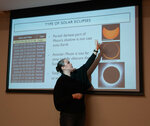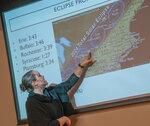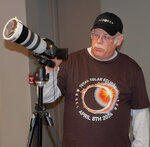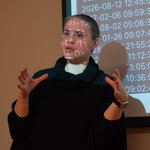For weeks we’ve all heard rumblings about a solar eclipse coming our way, but reports have been sketchy. While there’s no doubt that the sun is scheduled to blink out “sometime next …
Stay informed about your community and support local independent journalism.
Subscribe to The River Reporter today. click here
This item is available in full to subscribers.
Please log in to continue |




For weeks we’ve all heard rumblings about a solar eclipse coming our way, but reports have been sketchy. While there’s no doubt that the sun is scheduled to blink out “sometime next week,” I’ve been chasing after more info in order to prepare for this somewhat rare event.
Naturally, the first thing I did was to ask my phone the question on everybody’s mind: “OK, Google,” I said in a manly voice, “what is happening on April 8th 2024?”
The response was swift and matter-of-fact: “The solar eclipse is coming Monday, April 8. Once you’ve made your shadow box, bought your glasses and figured out how to make the time to watch the eclipse, there’s still one thing that could make your celestial viewing all for nothing—the weather.”
My head started swimming. Shadow boxes, special glasses, something called a “pin-hole camera” and concerns about the weather to boot? Oy.
Fortunately, I came across some help in the form of the Ethelbert B. Crawford Library and a fun and educational program held there last week. “Join local astronomy experts Irene Pease and John Kocijanski for an evening of solar eclipse exploration,” the library’s website enticed. “If you’re curious about the upcoming eclipse [I was], then this program is for you!”
I’m no dummy, but I’m also no Bill Nye, (the science guy) so I was a bit wary about understanding a lecture on the mechanics of how a solar eclipse takes place, other than the “obvious” components involving the sun, moon and Earth.
Folks may recall that there was a partial solar eclipse in the skies above the Upper Delaware River region back in 2017 and there was a fair amount of hoopla connected to that, but I’ve forgotten most of it, so was grateful to have both Irene and John on hand to break it down for us.
Pease began by explaining that a broad swath of North America—including parts of Mexico, the U.S. and Canada—will experience a total solar eclipse. We learned about the difference between a “partial” eclipse, (darkest part of moon’s shadow is not cast onto Earth) “annular” (moon is too far away to fully obscure the sun) and “total” (sun is fully obscured as seen from our home planet).
While the “path of totality” includes cities like Rochester, Buffalo and Syracuse, that doesn’t mean that we’ll be left out in the cold, weather permitting. “In fact,” she informed us, “although technically we’re only seeing a partial eclipse from our vantage point in this part of the country, we’ll see even more of the sun blocked out this time around: between 94 percent in Monticello, inching its way to 96 percent while viewing it from Roscoe, NY, just a few miles away.”
Because, you know, we’re spinning, the moon is a satellite and we’re all moving, all of the time. It’s a bit heady to contemplate, IMHO.
To be honest, my mind drifted for a moment, wondering what Earthlings thought about eclipses before we had experts like John and Irene to explain it to us in their “science-y” way, so I made a mental note to look into it once I got home.
Time and Date (dot com) seemed like a logical place to start. “Even today,” I read on the website, “an eclipse of the sun is considered a bad omen in many cultures.” I learned that our ancestors tried to understand why the sun temporarily vanished from the sky, so they came up with various reasons for what caused a solar eclipse. In many cultures, the legends surrounding eclipses involve mythical figures eating or stealing the sun. Others interpreted the event as a sign of angry or quarreling gods.
While it hardly seems palatable, there were many stories about the sun being eaten by one being or another. In Vietnam, for instance, people believed that a solar eclipse was caused “by a giant frog devouring the sun,” while Norse cultures blamed wolves for eating the sun. In ancient China, a celestial dragon was thought to lunch on the sun, causing a solar eclipse. In fact, the Chinese word for an eclipse, chih or shih, means to eat.
Right here at home, the Pomo, an Indigenous group of people who live in the northwestern U.S., tell a story of a bear who started a fight with the sun and took a bite out of it. In fact, the Pomo name for a solar eclipse is “Sun got bit by a bear.”
Apparently, none of them ever took a sip of scalding coffee, because that’s enough to make me cry—so I won’t be attempting to take a bite out of the sun anytime soon here at Camp Fox.
I could elaborate, but explaining “science-y stuff” is definitely not in my wheelhouse. Instead, I suggest you join John and members of the Catskills Astronomy Club (like ‘em on Facebook) at the “commons” (next to the bus stop) on campus of SUNY Sullivan starting at 2 p.m. on Monday, April 8. According to Irene’s (I mean Planet Earth’s) schedule, that’s when the event begins, reaching maximum at 3:25 p.m. and ending at 4:36 p.m.
What’s that about a pinhole camera? Go to www.timeanddate.com/eclipse/make-pinhole-projector.html.
As most of us know, I’m not all that smart, and undoubtedly, I got some stuff wrong. You should probably fact-check me here: www.scientificamerican.com/article/how-to-explain-aprils-total-solar-eclipse-to-kids/.
Fun Fact: “I’ll Follow the Sun” is a song by the English rock band the Beatles. When asked about the lyrics, songwriter Paul McCartney commented, “I wrote that in my front parlour in Forthlin Road. I was about 16. I seem to remember writing it just after I’d had the flu and I had that cigarette. I remember standing in the parlour, with my guitar, looking out through the lace curtains of the window, and writing that one.”
Comments
No comments on this item Please log in to comment by clicking here